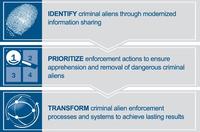-
FBI investigates News Corp. for potential 9/11 victim hacks
Lawmakers in the United States have waded into the growing controversy that has engulfed Rupert Murdoch’s media empire; on Wednesday several Democratic senators and Representative Pete King (R-New York), requested that the FBI begin an investigation into whether News Corp. attempted to hack into the phones of 9/11 victims; in response to their calls, the FBI opened an investigation into News Corp. to determine if the allegations of bribery and wiretapping are true
-
-
Bill to allow DHS to seize authority over U.S. coastlines
The House is currently considering a bill that would cede control of America’s coastlines to DHS; under the proposed National Security and Federal Lands Protection Act, the Secretary of the Interior would forfeit authority of all public coast lands to the Secretary of Homeland Security, whenever the DHS chief sees fit
-
-
Mica says TSA needs more independence from DHS
According to Representative John Mica (R-Florida), the Transportation Security Administration (TSA) needs more independence from DHS so that it may operate more efficiently; in an interview with Bloomberg, Mica, the chairman of the House Transportation committee said, TSA should be given “the authority to whack and hack some of the bad out”
-
-
Judge orders DHS to clarify whether Secure Communities is mandatory

On Monday, a New York judge ordered federal immigration officials to provide clarification on whether or not states and local law enforcement agencies had the ability to opt out of the controversial Secure Communities immigration enforcement program; the judge’s ruling comes as part of a Freedom of Information Act lawsuit launched by several immigration and legal rights groups
-
-
Ground Zero mosque clears legal hurdle

Last Friday, a federal judge dismissed a lawsuit attempting to block the construction of a mosque near Ground Zero in lower Manhattan; the mosque would be built in a building which once housed the Burlington Coat Factory located two blocks from site of the World Trade Center; the mosque may have cleared its legal hurdles, but before it can begin construction the developer’s must also overcome some large financial hurdles; an estimated $100 million is needed to complete the project, and the money has not yet been raised
-
-
Lawmakers introduce raft of border security bills
Border security continues to be a hot political issue, and lawmakers of both houses and both parties introduce a raft of new border security-related bills; the bills range from a measure to establish health care services along the U.S.-Mexico border to a proposal to educate border patrol agents about child trafficking to a bill calling for compensation to border counties for high level of undocumented aliens relying on county services
-
-
Supreme Court to hear GPS tracking case
The 220-year old Fourth Amendment to the Constitution offers protection against unreasonable searches; the Supreme Court agreed to hear a case involving the police secretly attaching a GPS device to a suspect’s car to monitor his movement; the question before the Court: does the secret placement of a GPS device on a suspect’s car in order to keep tabs on him for an extended period of time require a search warrant
-
-
Official dispels government green procurement regulation myths

The U.S. government owns or manages one in five acres in the United States, and is the largest domestic user of electricity; it is also one of the largest consumers of resources in the United States, purchasing on average $535 billion worth of goods each year; In 2009 President Obama issued an executive order requiring that all government agencies establish and implement plans to increase their environmental performance; speaking at the 2011 Security Industry Association’s (SIA) Government Summit to an audience of security professionals, a government official sought to clarify myths surrounding the government’s new green procurement regulations and assured government service providers that the rules would not drastically affect a company’s existing practices
-
-
SAFETY Act falls short
The SAFETY Act (the Support Anti-terrorism by Fostering Effective Technologies Act of 2002) was created in order to speed up the pace of homeland security-related technologies and solutions reaching the market; the act encourages private firms to develop technology to combat terrorism by providing liability protection in case a firm is sued; since applications by companies for Safety Act coverage began in 2004, not many more than 400 technologies have been approved under the act; critics say that number should be in the thousands; they say the act is a good idea — but few in the industry know about it
-
-
Author of controversial Arizona immigration bill could face recall

A heated political battle in Arizona has begun that could result in the author of the state’s controversial immigration law Senate President Russell Pearce’s recall; the leaders of the recall effort, Citizens For A Better Arizona (CFBA), say they have collected more signatures for the petition to recall Pearce than the number of votes he received in the last election; on Tuesday, the group submitted 18,315 signatures in support of the recall, more than double the state’s requirement of 7,756 signatures; before the recall can move forward, the Maricopa County Recorder’s Office must validate each of the signatures
-
-
Scientists charged with manslaughter for not issuing earthquake alert
The 6 April 2009 earthquake which shook the Italian city of L’Aquila killed 308 of the city’s residents, injured thousands, and caused wide-spread damage to buildings and infrastructure; prosecutors have decided to bring seven geologists to trial for failing to alert city residents about the impending tremor; the geologists, all members of Italy’s Major Risk Committee, met on 31 March 2009 to discuss the possible risk to the Abruzzo region, of which L’Aquila is the capital; the region had experienced several small tremors in the months before the meeting; in a press conference following the meeting, the geologists reassured residents of the region that no major quake was imminent, and that they had no reason to leave their homes
-
-
Industry leaders, policy makers to meet at SIA Government Summit
The Security Industry Association (SIA) is gearing up to hold its annual Government Summit conference in Washington, D.C. once again; each year the two day event brings security professionals, business leaders, and policy makers together to discuss the latest federal and state trends as well as the latest legislation and regulations that affect the security industry; the event’s headliners are Bill Kristol and Bill Press; the two will debate one another on a wide range of issues including the impact of the 2010 mid-term elections, the 2012 presidential campaign, as well as policy matters; the conference will be held on 21 June to 22 June at the Phoenix Park Hotel in Washington, D.C
-
-
Saudi woman driver released from jail

Saudi women are not allowed to drive because, according to Saudi senior clerics, prohibiting women from driving is a protection against the spread of vice and temptation because women drivers would be free to leave home alone and interact with male strangers; the prohibition forces families to hire live-in drivers or rely on male relatives to drive; on 21 May, a 32-year old woman posted on the Web a video of herself driving, and was promptly arrested and thrown in jail; her posting was part of a campaign calling on Saudi women to show up on 17 June in their family cars — driving, not being driven — for drive-around rallies for women’s rights in major Saudi cities
-
-
Minneapolis airport security drill upsets Muslim rights group
A national Muslim civil rights group is calling on DHS Secretary Janet Napolitano to investigate the reinforcement of racial profiling in training exercise after a recent security drill at Minneapolis-St. Paul International Airport; the drill took place on 12 May and involved a man of Middle-Eastern descent who attempted to smuggle a device made to look like a bomb hidden inside a shaving kit; in response to the exercise, the Council on American-Islamic Relations (CAIR) sent a letter to Secretary Napolitano on Monday requesting that she review “the use of outside trainers who offer hostile, stereotypical and grossly inaccurate information about Muslims and Islam”
-
-
Study urges DHS to stop seizing laptops at border
A recent report called on DHS to stop its border agents from searching electronic devices like laptops and smartphones of individuals entering the United States without reasonable suspicion of wrong doing; the study, released last week by the bipartisan legal think tank The Constitution Project, argued that computers and cell phones contain far too much personal information and searching these devices without probable cause violates privacy considerations; border patrol agents have routinely conducted searches of individuals and their belongings entering the country, it is only recently become a potential legal issue due to the vast amount of personal data that electronic devices can now hold
-
- All
- Regional
- Water
- Biometrics
- Borders/Immig
- Business
- Cybersecurity
- Detection
- Disasters
- Government
- Infrastructure
- International
- Public health
- Public Safety
- Communication interoperabillity
- Emergency services
- Emergency medical services
- Fire
- First response
- IEDs
- Law Enforcement
- Law Enforcement Technology
- Military technology
- Nonlethal weapons
- Nuclear weapons
- Personal protection equipment
- Police
- Notification /alert systems
- Situational awareness
- Weapons systems
- Sci-Tech
- Sector Reports
- Surveillance
- Transportation
Advertising & Marketing: advertise@newswirepubs.com
Editorial: editor@newswirepubs.com
General: info@newswirepubs.com
2010-2011 © News Wire Publications, LLC News Wire Publications, LLC
220 Old Country Road | Suite 200 | Mineola | New York | 11501
Permissions and Policies
Editorial: editor@newswirepubs.com
General: info@newswirepubs.com
2010-2011 © News Wire Publications, LLC News Wire Publications, LLC
220 Old Country Road | Suite 200 | Mineola | New York | 11501
Permissions and Policies
